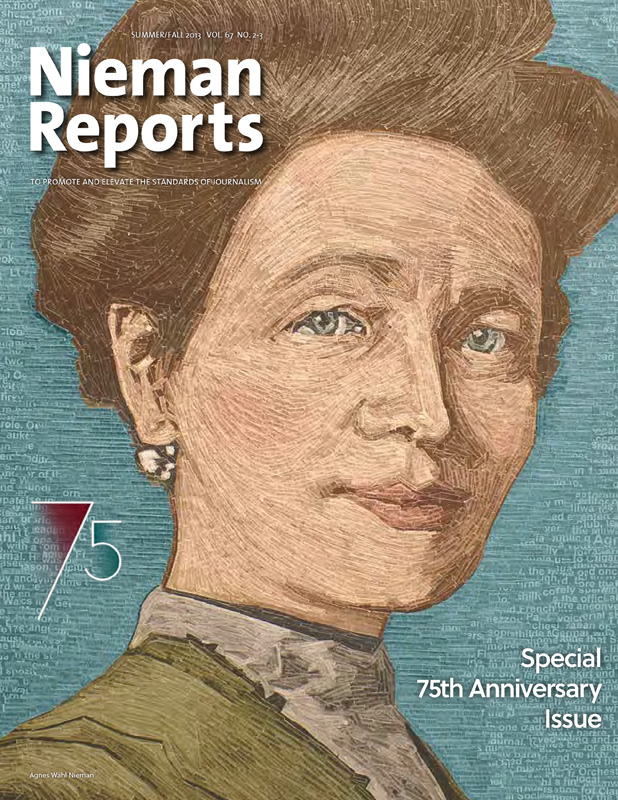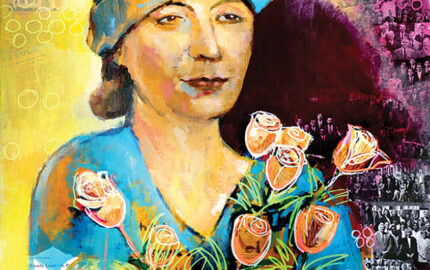
75th Anniversary Issue
As she lay dying, the widow of a Milwaukee newspaper editor made a gift that has now invigorated journalism for 75 years. Agnes Wahl Nieman, a well-educated woman with a fondness for bicycling, willed money to Harvard to “promote and elevate the standards of journalism.” That $1.4 million bequest (worth about $23 million in today’s dollars) funded the Nieman Fellowship program that has brought 1,442 journalists from around the world to Harvard for a year of study. To celebrate the Nieman Foundation for Journalism’s 75th anniversary, Nieman Reports tells the stories of 75 Nieman Fellows, among them pioneers in biography, documentary filmmaking, and investigative journalism.
Executive director of the Alicia Patterson Foundation, Engel has reported for The Washington Post and The Des Moines Register
 The setting was a Nieman seminar; the speaker one of Harvard’s most eminent full professors. With unusual frankness, he turned confessional. “I never feel that I’m part of the real Harvard,” he told our astonished group. “It’s always someone else—the real achievers—who make Harvard prominent.” Those words helped change my journalistic life. For a 26-year-old reporter from The Des Moines Register, to hear this prestigious professor confess to the fraud syndrome was eye-opening. It was the first in a cascade of revelations during my Nieman year that stripped prestige of its power. The twice-weekly dinners at the Institute of Politics also helped demystify the mighty, giving this reporter the courage to write for the readers rather than the rulers. Taking first-year Harvard Law classes and participating in grand rounds at Harvard Medical School was liberating. The first-ever intercession class on women and the law, taught by Martha Field, also clued me in to the injustice that was and is codified in so many of our legal pillars. After that, defending federal and state laws never was automatic for me. This was the unexpected bonus of my Nieman year—reducing the intimidation factor of the established, the prominent, and the rich. It paid off in my choice of stories: worker safety, patient health, and investigating miscreants at all levels. The Nieman year put me on a path of independent thinking, clearing away titles and honorifics to see what’s behind the curtain.
The setting was a Nieman seminar; the speaker one of Harvard’s most eminent full professors. With unusual frankness, he turned confessional. “I never feel that I’m part of the real Harvard,” he told our astonished group. “It’s always someone else—the real achievers—who make Harvard prominent.” Those words helped change my journalistic life. For a 26-year-old reporter from The Des Moines Register, to hear this prestigious professor confess to the fraud syndrome was eye-opening. It was the first in a cascade of revelations during my Nieman year that stripped prestige of its power. The twice-weekly dinners at the Institute of Politics also helped demystify the mighty, giving this reporter the courage to write for the readers rather than the rulers. Taking first-year Harvard Law classes and participating in grand rounds at Harvard Medical School was liberating. The first-ever intercession class on women and the law, taught by Martha Field, also clued me in to the injustice that was and is codified in so many of our legal pillars. After that, defending federal and state laws never was automatic for me. This was the unexpected bonus of my Nieman year—reducing the intimidation factor of the established, the prominent, and the rich. It paid off in my choice of stories: worker safety, patient health, and investigating miscreants at all levels. The Nieman year put me on a path of independent thinking, clearing away titles and honorifics to see what’s behind the curtain.
 The setting was a Nieman seminar; the speaker one of Harvard’s most eminent full professors. With unusual frankness, he turned confessional. “I never feel that I’m part of the real Harvard,” he told our astonished group. “It’s always someone else—the real achievers—who make Harvard prominent.” Those words helped change my journalistic life. For a 26-year-old reporter from The Des Moines Register, to hear this prestigious professor confess to the fraud syndrome was eye-opening. It was the first in a cascade of revelations during my Nieman year that stripped prestige of its power. The twice-weekly dinners at the Institute of Politics also helped demystify the mighty, giving this reporter the courage to write for the readers rather than the rulers. Taking first-year Harvard Law classes and participating in grand rounds at Harvard Medical School was liberating. The first-ever intercession class on women and the law, taught by Martha Field, also clued me in to the injustice that was and is codified in so many of our legal pillars. After that, defending federal and state laws never was automatic for me. This was the unexpected bonus of my Nieman year—reducing the intimidation factor of the established, the prominent, and the rich. It paid off in my choice of stories: worker safety, patient health, and investigating miscreants at all levels. The Nieman year put me on a path of independent thinking, clearing away titles and honorifics to see what’s behind the curtain.
The setting was a Nieman seminar; the speaker one of Harvard’s most eminent full professors. With unusual frankness, he turned confessional. “I never feel that I’m part of the real Harvard,” he told our astonished group. “It’s always someone else—the real achievers—who make Harvard prominent.” Those words helped change my journalistic life. For a 26-year-old reporter from The Des Moines Register, to hear this prestigious professor confess to the fraud syndrome was eye-opening. It was the first in a cascade of revelations during my Nieman year that stripped prestige of its power. The twice-weekly dinners at the Institute of Politics also helped demystify the mighty, giving this reporter the courage to write for the readers rather than the rulers. Taking first-year Harvard Law classes and participating in grand rounds at Harvard Medical School was liberating. The first-ever intercession class on women and the law, taught by Martha Field, also clued me in to the injustice that was and is codified in so many of our legal pillars. After that, defending federal and state laws never was automatic for me. This was the unexpected bonus of my Nieman year—reducing the intimidation factor of the established, the prominent, and the rich. It paid off in my choice of stories: worker safety, patient health, and investigating miscreants at all levels. The Nieman year put me on a path of independent thinking, clearing away titles and honorifics to see what’s behind the curtain.

